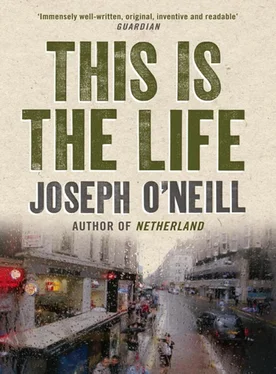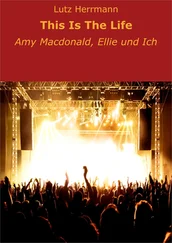Then everything fell into the place.
Tired of trying to decode the incomprehensible foreign utterings, my mind turned lazily, almost by way of recreation, to the dates of the writings and recordings — the last week of September 1988. It came to me instantaneously.
September 1988: it was in the beginning of September 1988, on the 8th of September to be exact, that Donovan had lost his powers of communication; that was when his ability to speak and write had deserted him, in Luxembourg, on his feet in the European Court of Justice. Of course, of course, I thought, of course! These notebooks and tapes were exercises in communication! The drawings of the squares and triangles, the list of words taken from the opening of a dictionary — they were all self-imposed writing drills, a systematic relearning of the ABCs! It fitted in, even the tapes of tongue-twisters — they were verbal circuits, designed to lick his speech back into shape. With these recordings Donovan was exercising his vocal cords for the first time in weeks, putting his pharynx, larynx, lips and glottis through their paces, forcing his organs of speech through the oral equivalent of squat-thrusts, sit-ups and star-jumps.
I switched the tape back on with a new sense of purpose.
Indiscriminately, senselessly it seemed to me, Donovan began articulating extracts from treaties, slowly quoting provisions of multilateral conventions — it was hard to say, from the tone of his delivery, whether he was relying on recollection or whether he was reciting from books at hand. What was clear was that he was plainly enjoying himself; in all probability this was the first time he had spoken properly since his breakdown in court. He was eating his words. Like a starved man at a banquet he pigged himself with vocables of any kind. He was wolfing down vowels, phonemes, diphthongs and consonants, making a meal of sibilants and alveolars and slowly regaling on labiodentals. He was licking clean the platter of pronunciation, and so palpable was his gastronomical relish that it almost made my mouth water. In the same way that his father’s enthusiastic eating habits gave me an appetite, hearing Donovan like this made me feel like saying a few words myself.
So I was right, then. I allowed myself a grunt of vindication. Oliver Owen was wrong. Donovan had not, after all, faked his collapse. It had been a bona fide breakdown.
The recording came to an end. Sweating a little (I was still in my raincoat, I was not planning to stay long) I went back to the notebooks to steal a last glance at their contents before I went. I picked up a fresh one dated 26 September 1988 — the day after Tape 1 had been made. When I saw what was written, I took off my raincoat. This I had to read.
The first thing I noticed was this: Donovan’s handwriting had progressed from the careful, scuttling script of the previous notebook. He wrote more cursively, in the semi-legible fashion I recognized from my pupillage, the letters small and purposeful, and I could tell that he was at ease with himself. Then I thought: what was it he had written down so flowingly?
Cases. Set out, for twenty-seven pages, and in no particular order, were law cases. It was an extraordinary sight. There were decisions from just about every field of the law I knew something of, cases in company law, contract, tort, conflicts of laws, criminal law, insurance law, road traffic law, public international law, commercial law, Islamic law, employment law and constitutional law. There must have been thousands of authorities on those pages — and not just famous ones like Donoghue v. Stevenson or Salomon v. Salomon , but piddling, minute cases nobody had ever heard of, like Lochgelly Iron & Coal Co. Ltd. v. Crawford and Re Euro Hotel (Belgravia) Ltd. In awe I realized what Donovan had done: effortlessly, as though he were emptying his pockets, he had turned his mind inside out. What was remarkable was not simply the number of cases on view (not many lawyers could, off the top of their heads, name more than a hundred), but the fact that there was no mnemonic device that I could spot: no numbers, no alphabetical sequences, no classification according to subject. Yes, he knew those cases like the back of his hand. In fact, so fluid and complete was Donovan’s grasp of his legal materials that it did not seem as though his powers of recall came into it. He had not remembered these names, he had taken biological possession of them; it was as though they had entered him intravenously and now ran through his veins.
This blood relationship was illustrated by the next two lists, which organized the cases into, firstly, calendrical order, then into thematic blocks. I shook my head. Surely no one had ever known so much law so well! In a daze I turned to the last list — the names, I guessed, of all of the actions in which Donovan had ever received a brief. Again, this was an extraordinary feat — the equivalent, I would say, of naming every person you had ever met, in order of appearance.
I breathed deeply and sat back in my chair. I knew, of course, the purpose of these lists — they were a continuation of the training programme that Donovan had imposed on himself to regain his fighting fitness. This was like Mike Tyson pumping iron in the mountains. I marvelled at his self-discipline and his determination. With all his natural talent, still he drove himself to the limit of his abilities.
Closing the notebook, I happened to look down. There, in the corner of the room, I noticed for the first time a large terrestrial globe. It was not a political globe. There were no borderlines or territorial delineations or colour schemes denoting spheres of political influence. The cartographer was concerned only with the natural features of the planet. Mountains, oceans, gulfs, continents, rivers, deserts and volcanoes were given their names, but there was no sign of states, cities, duchies, sheikhdoms or dioceses. Submarine gradations and profundities were particularly detailed, with the continental shelves shown in silver-white, the abyssal plains in cobalt and the deep ocean trenches in delft blue. All in all, the world looked pretty good like that, I thought. (It was only later that I realized the globe’s significance to Donovan.)
Then, looking further around, I saw, among the rows and rows of law reports that ran around the walls, a section of the shelves filled with miscellaneous law books. I recognized a few names — Lauterpacht, Jennings, McNair, Brownlie, H. L. A. Hart — but nothing unusual caught my eye. Nothing, that is, until I saw a stack of computer paper of the continuous, perforated kind, on the bottom shelf. I stood up and went over. The sheaf of papers was at least four inches deep, and on the top page were printed the words Supranational Law.
A book — it was the draft of a new book. Carefully, making sure my fingers did not leave a smudge, I leafed through the sheets. Yes, there was no doubt about it. This was a major new work.
Here I have to stop. Here I have to call a halt to this headlong gallop of words, because it is from here on in that things begin to get a little less straightforward. Until now the going has been easy, until now it has been a canter: but the moment has arrived to proceed with caution. In cowboy films you sometimes see a group of riders, a posse, after some outlaw. For a while their man is visible in the distance, a puff of smoke among the buttes. Then the terrain changes. The land starts to undulate and the riders lose sight of the outlaw behind hills. They are forced to dismount, to study the ground for his trail. Now perhaps I am being a little fanciful, but right now I could be in that posse, hot on the heels of Donovan’s mystery; and, likewise, I am going to have to start looking out for tracks in the dust. Why? Because I am approaching the moment when the incomprehension that afflicts me begins to set in, when things start knotting mazily in my head. My problem is not that I am not sure exactly what occurred next. I have an outline of the facts in my mind right at this moment. If the telephone rang and someone asked me to relate the events that followed, I could do so without any difficulty at all. No, I have no doubts at all about what took place: only I am beginning to think that there is a difference between what took place and what really happened. Now it may be that I am splitting hairs — maybe, as lawyers are fond of saying, I am drawing a distinction without a difference. But I do not think so; because the facts, on their own, lead me to confusion. Somewhere, during this last year, I lost track of Donovan, which means that somewhere there is a spoor that I have missed.
Читать дальше
Конец ознакомительного отрывка
Купить книгу












